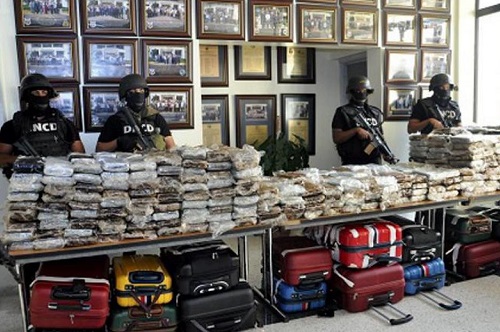DR photo
By
Ricardo Swire
CARICOM’s main force behind high murder and crime rates is intra-regional drug trafficking. The global drugs trade’s expansion to the tropical islands has institutionalized local criminal behaviour. The scourge also increased property crimes committed by drug users and underpinned steady illegal gun flows. The Caribbean chain is strategically positioned at a crossroad of drug shipments moving north from the Andean region to consumer markets.
Such importance was demonstrated by the interception of a Falcon 50 twelve seater private jet registered to Transhelicopter Services Company. Acting on shared intelligence a Dominican Republic National Directorate for Drug Control coordinated multi-agency enforcement offensive grounded the aircraft. Agents discovered twenty-six suitcases, carrying seven hundred kilos of cocaine, worth US$14 million. The jet’s flight plan traced its route from Punta Cana in the Dominican Republic, thru the Azores to Yvelines Airport near Paris.
Caribbean intelligence statistics recorded no less than two hundred and sixteen tons of cocaine traversed Guyana, Suriname and French Guiana en route to America and Europe yearly, such amount equating to half of America and Europe’s total cocaine imports. At one stage the drug trade’s economic importance was 3.5% of the formal sector’s Gross Domestic Product (GDP).
Regionally, marijuana production and exports were not classified as very significant. But nationally Jamaica, Trinidad & Tobago (T&T), St Vincent & the Grenadines registered “significant” marijuana production. Jamaica’s drug trade calculated at 7.5% of national GDP. Six T&T communities surrounding Port of Spain accommodated half the Republic’s murders. In four years 53% of T&T’s killings were labelled drug-related assassinations. Trends reflected Caribbean crimes aggravated by an inflow of deportees. The deviant characters adopt unsavoury behaviours on resident islands, mostly developed in New Yorknand London.
Over a fifteen year period Jamaica, T&T and Guyana received thirty thousand deportees. English speaking Caribbean sector’s sub-standard crime management has hampered foreign and domestic investment and stalled economic growth. Additional security measures due to crime increased businesses’ operation costs, diverting expansion and productivity investments. Since Jamaica’s Tivoli posse strongman Dudus’ downfall detention and extradition to America four battling Posses aspiring to replace him contributed to Jamaica’s inflated murder rate.
The Caribbean’s substandard criminal justice systems have retarded the impact of local public safety and law enforcement initiatives. Hopefully the novel Criminal Justice Reform Project (CJRP), sponsored by the American Embassy and British High Commission in Barbados, will be successful in its “overarching goal” to reform and improve the efficiency of CARICOM’s antiquated criminal justice system.
For too long society’s vicious circle of poverty, social exclusion and lack of formal sector opportunities have fueled Caribbean islands’ gang membership. Underage criminal gang members often set free of heinous crimes by law courts due to legal loopholes. Such available “recruits” will always be gullible to the easy cash and glamorous enticements of underworld life.
Ricardo Swire
Ricardo Swire is the Principal Consultant at R-L-H Security Consultants & Business Support Services and writes on a number of important issues.



No Comments Yet!
You can be first to comment this post!